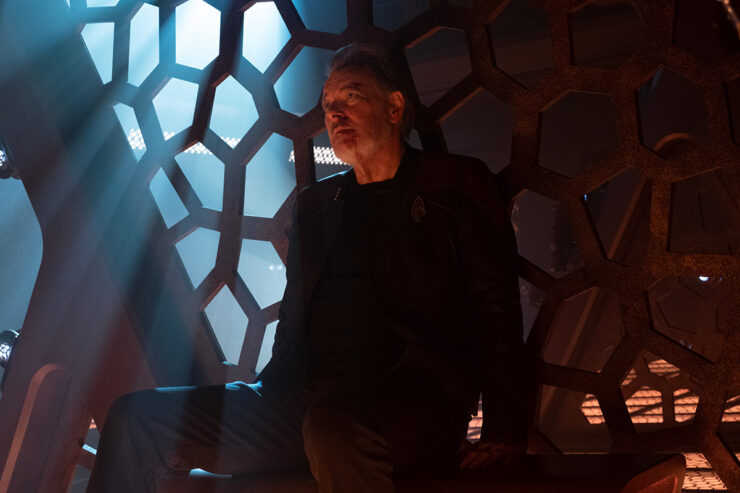There is a lot that happens in this week’s Star Trek: Picard, which has a very apt title in “Surrender,” as there’s a lot of surrendering and playing at surrendering and surrendering and going back on it, and so on.
There’s also a moment that royally pissed me off, several unanswered questions, some superb acting—including at least one instance of it that draws a bit too much attention to itself—proof that I was right about something last week that several folks thought I was wrong about, and a moment we’ve been waiting all season for.
Let’s get the annoyances out of the way. First of all, there’s the thing that royally pissed me off, which is that Vadic kills someone. Holding the bridge crew hostage, and threatening to kill a hostage every ten minutes unless Jack gets his ass to the bridge, Vadic makes good on that threat after the first ten minutes.
We’re teased with who she’ll kill—she asks both Esmar and Mura to identify themselves by name, and we figure she’ll shoot one of them. But then she turns and shoots T’Veen, instead.
Okay, I’m way more invested in Titan’s bridge crew than perhaps I should be, given that they’re little more than ciphers, but I’m curious. I want to know why Mura has a given name of Matthew when he’s Bajoran. I want to know how telepathic Esmar is—there had to be a reason why they were the one who said they knew who Jack was in his hallucination, and they’re a Halian, established in TNG‘s “Aquiel” as being telepathic—and I want to know more about T’Veen and now we never will because she’s dead. Dagnabbit. I really like Stephanie Czajkowski from her work on Doom Patrol, and I’m hugely disappointed that we won’t be seeing her again.
Sigh.
All right, moving on, the moment that we find out that Mura’s given name is Matthew is right before he has a lovely moment of awesome where he refuses to give in to Vadic in any way, even though it’ll leave his son without a father, because he’s Starfleet.
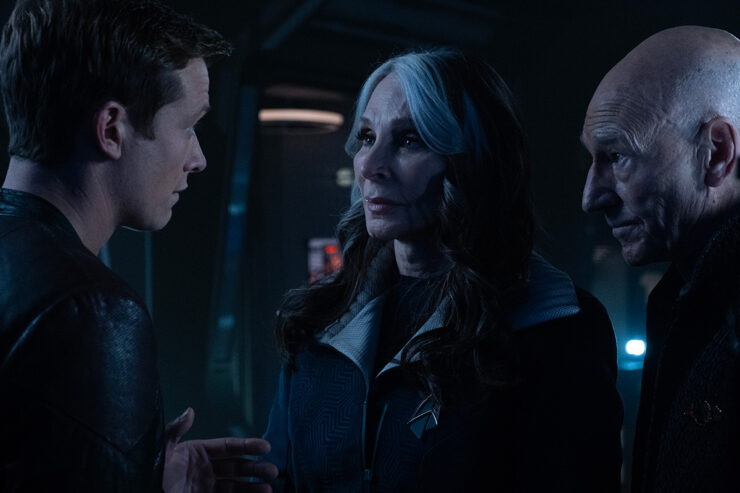
And that happened right after Jack took over his body and had him try to enter Picard’s code that would allow them to take control of the ship back. Despite what some folks said in the comments last week—which was contradicted by what was actually onscreen in “Dominion,” but whatever—Jack does, in fact, telepathically manipulate people, as he does to Mura in this episode before Vadic catches him out.
It’s a good plan that fails, because sometimes you roll a 20 and sometimes you roll a 5. And so they go to Plan B, which involves getting Data to take over the ship. But that requires that they lower the partition between Data and Lore and hope that Data wins. Which is a problem, because Data has ethics and Lore really really doesn’t.
The battle between them is at once pure fan service and also pure actor service. It’s primarily an acting exercise for Brent Spiner, who gets to stand in a room with himself and alternate between Data’s deadpan and Lore’s OTT shtick. The fan service is in what happens, as Data, seeing that Lore is succeeding in taking over their shared body and stealing his memories, decides to simply give Lore his memories. We get a greatest hits of Data’s past, including his interest in Sherlock Holmes (we even get audio flashbacks to Data and La Forge playing at Holmes and Watson on the holodeck from TNG’s “Elementary, Dear Data”) and poker, his fling with Tasha Yar (from TNG’s “The Naked Now,” as represented by the hologram he kept of her, seen in TNG‘s “The Measure of a Man” and “The Most Toys”), and, of course, his cat Spot.
And because you are what you eat, Lore absorbing all those memories makes him, in essence, become Data. Data only pretended to surrender to Lore, and the result is a new being who combines Data’s personality and compassion with Lore’s snottiness. Yes, Data has now become every single male lead in an action movie in the twenty-first century! Oh, and he can use contractions now, which has to be a relief for both Spiner and the scripters.
For all that it’s self-indulgent, it does provide a lovely moment when La Forge asks Data how he feels, and Data hesitates, and then says, simply, “I feel.” It’s a beautiful moment, and in many ways, the culmination of all of Data’s prior appearances, as he finally gets to take a shot at being human. Well, human-ish, anyhow…
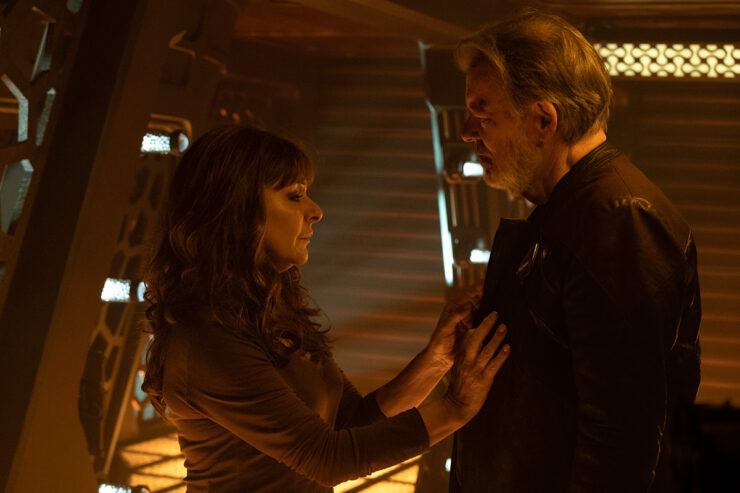
Meantime, we finally look in on Riker and Troi, with this week at last giving Marina Sirtis a role of substance after three glorified cameos. Kudos to scripter Matt Okumura as well as to Sirtis and Jonathan Frakes, who do a beautiful job with their spousal banter, and also finally explaining what’s been happening with the two of them. We find out that Troi was using her telepathic bond with Riker to tamp down his grief to help him deal with it—and also to help her deal with it, because as a telepath/empath, she felt her own grief as well as her husband’s (and, presumably, their daughter’s). Belatedly—as they sit in a prison cell—she remembers that there are no short-cuts in therapy, including the grieving process. She also forgot that counselors shouldn’t treat family.
But it explains why Riker needed to get away, as he said in “The Next Generation,” but also how him having issues with Thad’s death is causing problems now when he and Troi seemed—if not fine—at least in decent shape in “Nepenthe.” They also have a hilarious bit where they both realize that they absolutely hate living on Nepenthe. It was where they went in the hopes of helping Thad, and then they just stayed there out of inertia, and watching them come to the realization is a delight.
Buy the Book


Dead Country
They’re rescued by Worf and Musiker, and this episode solidifies what I joked about in my review of “Seventeen Seconds”: the next Secret Hideout Trek show should be Worf and Raffi, Agents of Starfleet. Their chemistry is perfect, and I love that they’ve settled into a mentor/student relationship, with Worf criticizing her fighting technique after she singlehandedly takes out a mess of Vadic’s thugs. (Riker’s only comment is a very respectful and impressed, “You’re scary.”)
In general, I’m loving how easily Michelle Hurd is sliding into the ensemble. Her first meeting with Troi as she’s downloading Shrike’s database is beautifully done. “Raffi.” “Deanna. Strange days, huh?” “Tell me about it.”
In addition, we get the first misstep in Worf’s characterization, as his reunion with Troi results in him waxing rhapsodic about how much he’s thought about her over the years as he’s worked to improve himself, and does so in a manner that is, well, pretty creepy. And which also calls back to the abortive Worf-Troi romance of the seventh season of TNG, which nobody was crying out for. Troi is much better with Riker and Worf was much better with Jadzia Dax, and this was just weird.
However, we also get another clue to why the changelings stole Picard’s body. Worf and Musiker find it on Shrike, and the changelings dissected his brain, removing the bits of his parietal lobe that were infected with Irumodic Syndrome. Musiker downloads the database, but we don’t get to find out what’s in it this week, nor why Picard’s (and Jack’s) Irumodic Syndrome is so important.
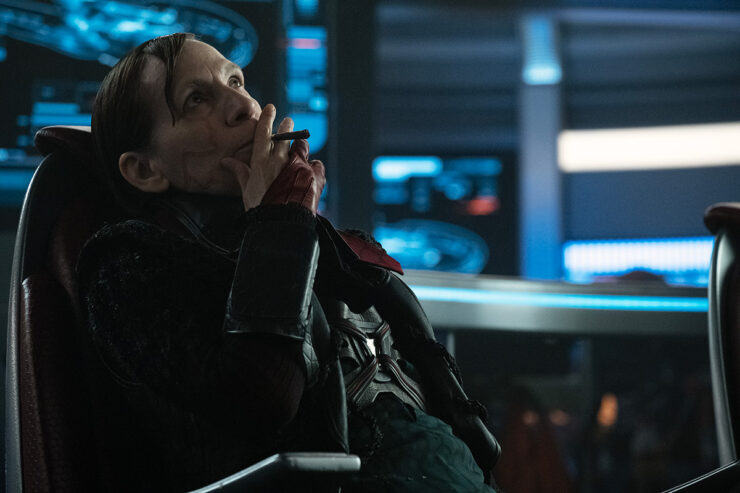
They abandon ship once they’re discovered, just in time for Data to retake control of Titan from Vadic, enabling them to come on board. Data is able to do so because Jack was kind enough to distract Vadic. Another of our fake surrenders is Jack finally going to the bridge before anyone else is killed, but holding what looks like a grenade, resulting in a standoff. Jack says he’ll activate it, and while it may not kill Vadic, it will kill Jack. Since Vadic wants him alive, that’s a problem. Vadic lets the bridge crew go—but Seven stays behind. (More on that in a bit.)
Vadic doesn’t quite make good on her promise to tell Jack what he is. What she does reveal is that she knows all about what he’s going through: the voices he hears and the red door he keeps seeing. But she never actually tells him what he is, even though she obviously knows—
—and then Data wakes up, plugs in, and takes over the ship. “Greetings, U.S.S. Titan, this is your friendly positronic pissed-off security system, back online. Unwanted guests and monologuing protoplasms: I am issuing an immediate shift change.” (Monologuing Protoplasms is the name of my next band…) At this point, we find out that Jack’s grenade isn’t a grenade at all—it’s a force field. He activates it around himself and Seven and then Picard orders the evacuation hatch in the viewscreen blown. Vadic’s last words are, “Fucking solids” before she and her thugs are blown out into space.
Seven—who got to declare, “Get off my bridge!” at Vadic before she got spaced—has an interesting little mini-arc here. Shaw rebukes her for not blowing the turbolift last week, but she wasn’t willing to sacrifice the captain’s life. Seven spent twenty of the first twenty-six of her years as a Borg drone not valuing, or even entirely understanding, individual life. Then she spent four years on Voyager being taught the value of a person’s life, and also experiencing grief for personal loss. (Notably in Voyager’s “Drone” and “One Small Step.”) Later on, once back in the Alpha Quadrant, she had to euthanize her son figure, Icheb (“Stardust City Rag”).
So she is absolutely not going to sacrifice a life if she can avoid it. She has the most extreme reaction to Vadic’s desire to kill someone, and Vadic sees that and makes her be the one to inform everyone that T’Veen was the one vaporized. Shaw dings her for this—she won’t always have that luxury, and there are consequences. Seven accepts those consequences when she decides to stay on the bridge with Jack and his pseudo-grenade.
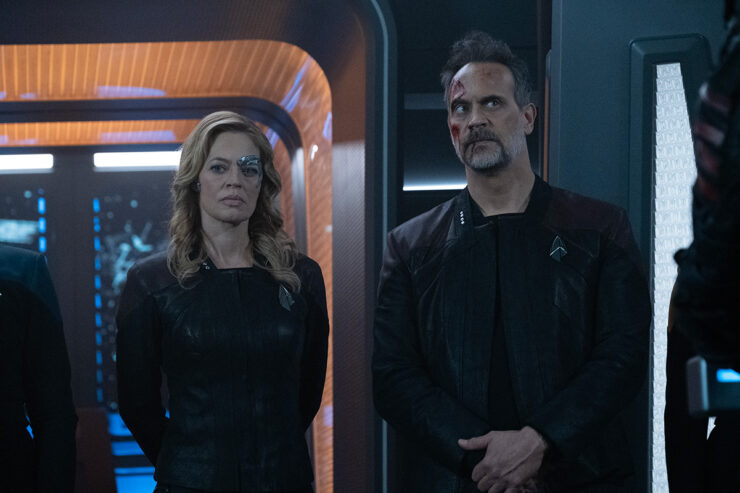
Seven also says something to Shaw that she should’ve said when she first reported to Titan: that her name is Seven of Nine. That’s the name she chose, not the one she was born with and which was taken from her at age six, and Shaw’s continued insistence on using it is absolutely despicable and shouldn’t be something anyone does now, much less in the enlightened future of the Federation.
I must mention that we get another shot taken at Château Picard wine. Worf referred to it as “sour mead” in “The Bounty,” and La Forge and Picard are able to prove that the other isn’t a changeling with an exchange about a gift of Château Picard bordeaux that La Forge thought was too dry because, as Picard says, “your taste in wine is pedestrian at best.”
And then, in the end, we get the moment we’ve been waiting eight friggin’ episodes for: the big seven, all sitting around a table, having a meeting. Just like the good old days. (Hard to say what the best line in that lovely scene is, but my vote is for Worf saying that he slew many enemies over the years and considered sending their heads to everyone at the table, but decided it would be passive-aggressive.)
In addition to her various catharses with her husband, Troi also gets to do an old standby of hers: looking constipated due to something she feels with her empathic powers. In this case, it’s Jack—or, more specifically, the darkness she senses around Jack. So she has a one-on-one therapy session with him, in which they’re going to try to open that red door together.
But we won’t find that out till next week at the earliest, as that’s where the episode ends.
We still don’t know what the big deal is about Irumodic Syndrome. We still don’t know what the changelings are going to do exactly on Frontier Day.
Oh, and one big unanswered question: what happened to Picard’s body? Riker, Troi, Worf, and Musiker stand around it on the Shrike, and then they run off, and seem to leave the body behind. Later on, Shaw has Seven destroy the Shrike. Was Picard’s body still on board? Is it blown up now? What about the bits of his parietal lobe?
There’s only two episodes left, so one hopes at least some of these questions will be answered. Especially since now we finally have the whole band back together at last…
Keith R.A. DeCandido’s Star Trek: The Next Generation fiction includes the novels Diplomatic Implausibility, Q & A, The Brave and the Bold Book 2, and A Time for War, a Time for Peace, the novella Enterprises of Great Pitch and Moment (part of the Slings and Arrows eBook miniseries), the short story “Four Lights” in The Sky’s the Limit, and the comic book miniseries Perchance to Dream.










